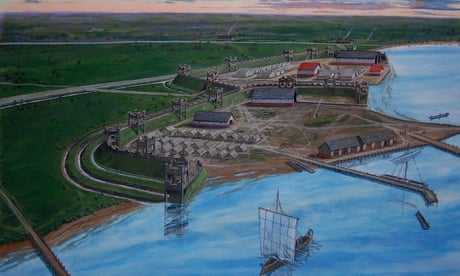- by foxnews
- 23 May 2025
Large Roman fort built by Caligula discovered near Amsterdam
Large Roman fort built by Caligula discovered near Amsterdam
- by theguardian
- 27 Dec 2021
- in news

A large Roman fort believed to have played a key role in the successful invasion of Britain in AD43 has been discovered on the Dutch coast.
The fortified camp appears to have been established by Emperor Caligula (AD12 to AD41) in preparation for his failed attempt to take Britannia in about AD40, but was then successfully developed and exploited by his successor, Claudius, for his own invasion in AD43.
Within three years, the Romans had claimed the whole of Britain as part of their empire.
The first evidence of a Roman fort in Velsen, North Holland, had been uncovered in 1945 by schoolchildren who found shards of pottery in an abandoned German anti-tank trench.
Research was undertaken in the 1950s during the building of the Velsertunnel, under the Nordzeekanaal, and archaeological excavations took place in the 1960s and 70s.
But at this stage the Velsen camp, identified as having been used between AD39 and AD47, was thought to have been small.
This theory was complemented by the discovery in 1972 of an earlier fort, known as Velsen 1, which is believed to have been in operation from AD15 to AD30. A thoroughgoing excavation of that site found it had been abandoned following the revolt of the Frisians, the Germanic ethnic group indigenous to the coastal regions of the Netherlands. Archaeologists discovered human remains in some former wells, a tactic used by retreating Romans to poison the waters.
The existence of the two forts within a few hundred metres of each other had led researchers to believe for decades that they were both likely to have been mere castellum, minor military camps of just one or two hectares.
It was only in November, through piecing together features of the later Veslen fort that were noted in the 1960s and 70s, but not recognised at the time as Roman, and taking into account his own archaeological findings over the last quarter of a century, that a new understanding was reached.
The Velsen 2 fort was abandoned in AD47 after Claudius ordered all his troops to retreat behind the Rhine. Roman rule of Britain ended around AD410 as the empire began to collapse in response to internal fighting and the ever-growing threats from Germanic tribes.
- by foxnews
- descember 09, 2016
United Airlines flight returns to Hawaii after concerning message found on bathroom mirror; FBI investigating
United Airlines Flight 1169 to Los Angeles returned to Hawaii after a "potential security concern" aboard the plane. The FBI and police are investigating.
read more


